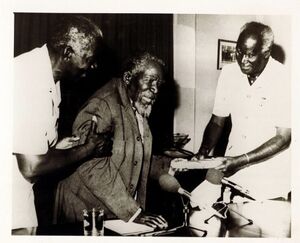Donald Siwale
| Born | 1878 Northern Rhodesia (now Zambia) |
|---|---|
| Nationality | Zambian |
| Occupation | Politician |
| Years active | |
| Known for | Nationalist, Political activist |
| Notable work | |
| Awards | |
| Children |
Donald Siwale (1878-1983) was a prominent Zambian nationalist and politician who played a key role in the fight for Zambia's independence. As an influential figure in Northern Rhodesia's pre-independence political movements, Siwale contributed to the early political organisation and advocacy that laid the groundwork for Zambia's liberation from British colonial rule in 1964. He was the first teacher and freedom fighter to have come from Nakonde district and the first one to translate the English Bible to Namwanga.
Early Life
Donald Siwale was born in 1878 in Northern Rhodesia (now Zambia).He hailed from Chieftainesses Waitwika of the Namwanga in the northern part of the country. Siwale pursued education during a time when access to formal schooling for Africans was limited, becoming one of the relatively few educated Africans during the colonial period. His education and leadership potential quickly earned him respect in both his community and among his peers.
Career

As chairperson of the African Welfare Societies, Siwale's entry into politics was marked by his strong advocacy for African rights and self-governance. During the colonial period, Northern Rhodesia was governed by the British under a system that heavily favoured European settlers, marginalising the African majority. Siwale, along with other nationalists, became vocal critics of the racial inequalities and lack of political representation for Africans.
In the 1950s, Siwale became involved in the burgeoning nationalist movements that sought to challenge British rule. He joined the Northern Rhodesia African National Congress (NRANC), one of the earliest political organisations advocating for African self-determination in the territory. He worked closely with other notable figures like Harry Nkumbula and Kenneth Kaunda, who would later go on to lead the country to independence.
Siwale played a key role in organising and mobilising support for the cause of independence, using his influence to rally people against the colonial administration. His speeches and writings were instrumental in raising awareness of the need for political reform and greater African representation in government.
Along with Paul Mushindo and others, Siwale helped translate the Bible into his native language, Namwanga.
Role in Independence Movement
During the 1950s and early 1960s, Northern Rhodesia experienced growing unrest as nationalist movements gained momentum. Siwale was an active participant in the protests, strikes, and political campaigns that called for an end to colonial rule. He participated in negotiations with the British government, pressing for constitutional reforms that would grant Africans greater political power.
Siwale’s leadership extended beyond political activism. He was also involved in grassroots movements, working to improve education and social conditions for Africans. He believed that political independence could only be achieved through the empowerment and education of the African population.
Contribution to Zambia's Independence
In 1964, Northern Rhodesia gained independence and became the Republic of Zambia. While figures like Kenneth Kaunda and Harry Nkumbula are often most closely associated with the independence struggle, Siwale's contributions as an organiser and advocate for African rights were crucial in laying the foundation for Zambia’s liberation. His work in the independence movement earned him a place among the nation’s respected leaders.
Death
Siwale died in 1983 at the age of 105.
Legacy
Though Donald Siwale did not seek the same level of political office as some of his contemporaries after independence, his influence remained significant. He is remembered as one of Zambia’s early political pioneers, whose efforts helped shape the future of the country.
Siwale’s legacy is one of dedication to justice, equality, and the upliftment of the African people. His contributions to Zambia’s independence struggle are recognised as vital in the long and difficult road to freedom.
In his honour, Donald Siwale Technical School was constructed in Nakonde district in Muchinga Province of Zambia, making it the second standard secondary school besides Mwenzo Girls Secondary School. The construction started in 2011 and completed in 2019.
See Also
- Kelvin Siwale
- Zambia
- Northern Rhodesia
- Kenneth Kaunda
- United National Independence Party
- History of Zambia
References
1. Gertzel, Cherry, et al. The Dynamics of the One-Party State in Zambia. Manchester University Press, 1984. 2. Hall, Richard. Zambia. Praeger Publishers, 1965. 3. Caplan, Gerald L. The Elites of Barotseland, 1878-1969. University of California Press, 1970. 4. Rotberg, Robert I. The Rise of Nationalism in Central Africa: The Making of Malawi and Zambia, 1873-1964. Harvard University Press, 1965.